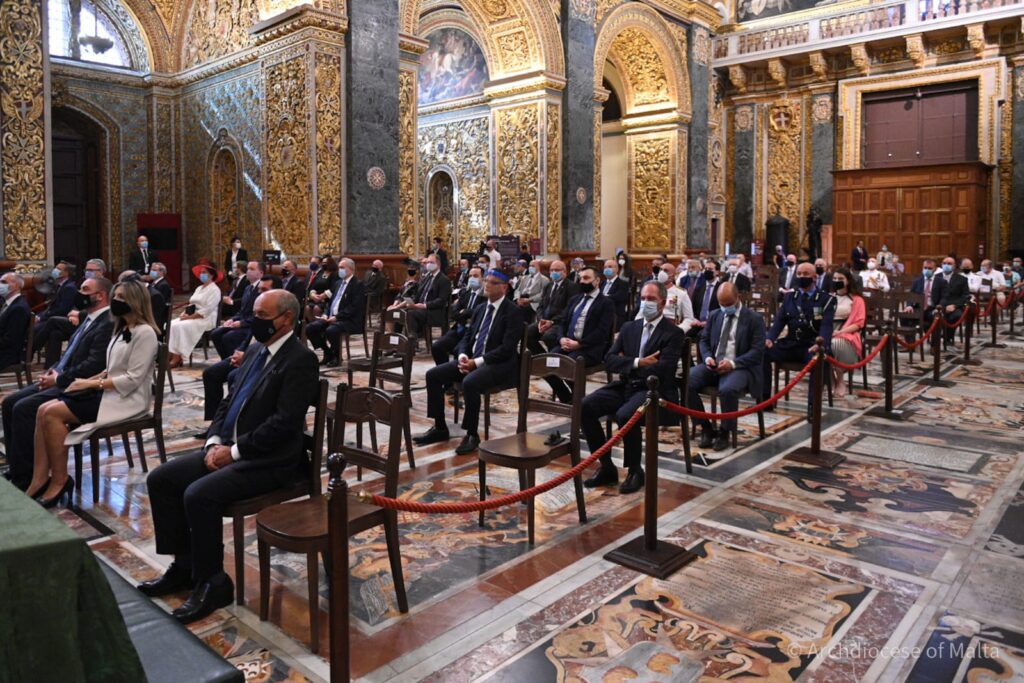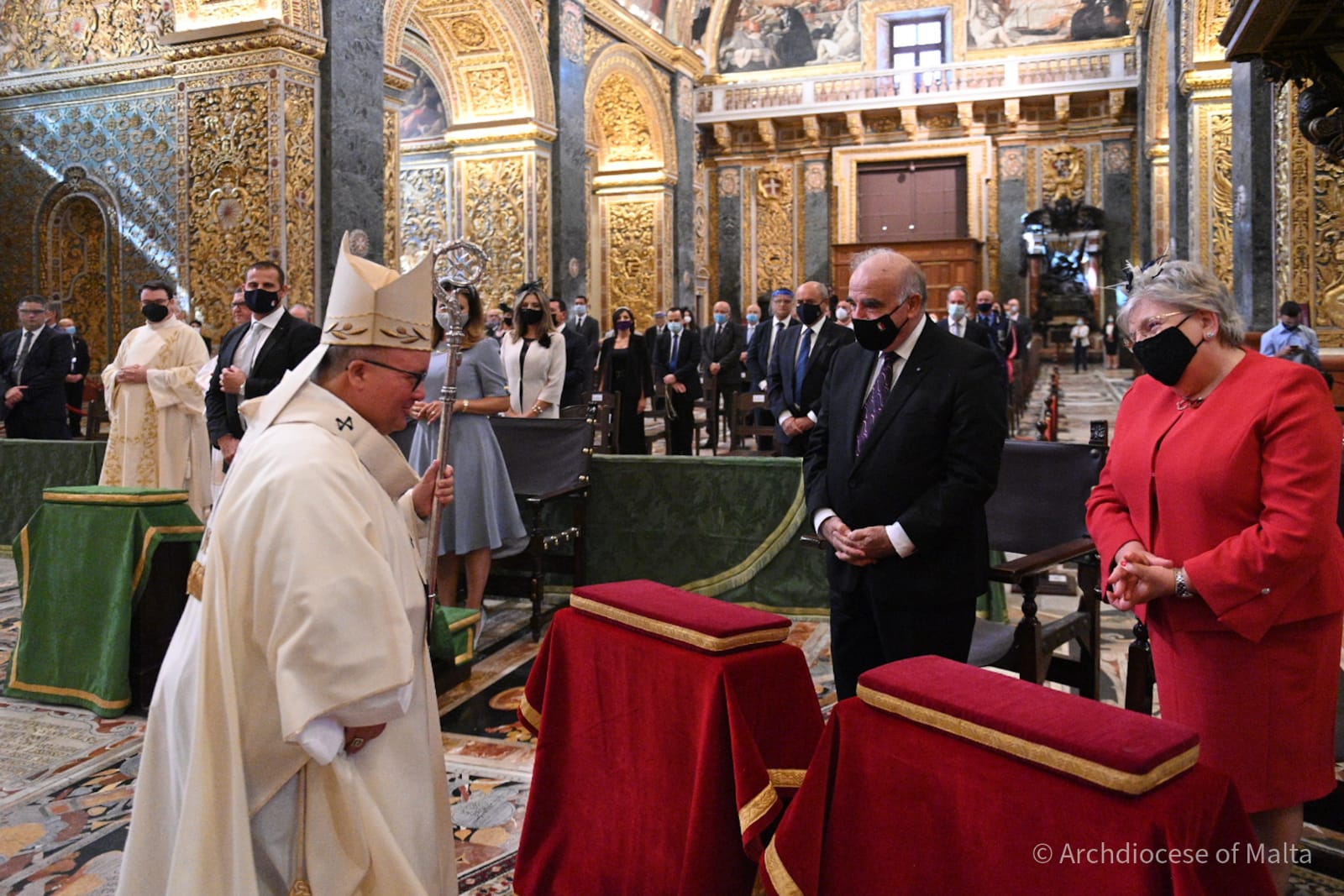Homily by Archbishop Charles Jude Scicluna
As we celebrate this year’s Independence Day we recognise that we are celebrating an important milestone in our nation’s constitutional history – the birth of Malta as a sovereign nation governed by the Maltese people. However, we cannot ignore the fact that we are celebrating this day amid a pandemic which has impacted the world and us all.
On the 5th August 2020, His Holiness Pope Francis began a new series of catecheses on ‘Healing the World’, as part of his weekly general audience. The Pope said: “Although the Church administers Christ’s healing grace through the Sacraments, and although she provides healthcare services in the remotest corners of the planet, she is not an expert in the prevention or the cure of the pandemic. She helps with the sick, but she is not an expert. Neither does she give specific socio-political pointers. This is the job of political and social leaders. Nevertheless, over the centuries, and by the light of the Gospel, the Church has developed several social principles which are fundamental principles that can help us move forward in preparing the future that we need. I cite the main ones which are closely connected: the principle of the dignity of the person, the principle of the common good, the principle of the preferential option for the poor, the principle of the universal destination of goods, the principle of solidarity, the principle of subsidiarity, the principle of the care for our common home. These principles help the leaders, those responsible for society, to foster growth and also, as in the case of the pandemic, the healing of the personal and social fabric. All of these principles express in different ways the virtues of faith, hope and love.”
Today, I would like to share a short reflection inspired by these seven principles of the Church’s social doctrine mentioned by Pope Francis.
The first principle is the dignity of the person. We are referring to the dignity of every person. This forms the basis of the fundamental rights as entrenched in the Constitution of the Republic of Malta. The first among these rights is the right to life, which implies respect towards the life of every individual from the beginning of human existence, from conception to natural death. The dignity of the person also demands respect for one’s conscience. The Second Vatican Council document Gaudium et spes teaches: “In fidelity to conscience, Christians are joined with the rest of men in the search for truth, and for the genuine solution to the numerous problems which arise in the life of individuals from social relationships” (no. 16).
The principle of the common good teaches us that we need a remedy for every kind of egoism which may contaminate and corrupt an authentic approach to politics. If politics is to serve as an expression of service and love, it needs to be detached from every motivation of personal gain. We need to develop a genuine sense of belonging towards the State, which helps us develop respect of the rule of law, as well as responsibility and accountability. As a result, we will enjoy good governance which always strives for the common good.
The preferential option for the poor reminds us that in whatever circumstances we find ourselves, and irrespective of the progress we generate, the poor will always be among us. Often, they knock at the doors of our shores as migrants and refugees, pleading for help. In this time of pandemic, the preferential option for the poor is also an option in favour of the sick and vulnerable. The preferential option for the poor is the remedy against the temptation of embracing a throwaway culture where a person’s worth depends on his or her strengths or how useful he or she is to society. Every person is intrinsically valuable because he or she is made in the image of God. Our society and our country are to be commended for the great progress achieved in social welfare, however we need to remind ourselves that the greatest investment will always be in education. When we face the reality of poverty we realise that more often than not this is rooted in lack of education.
Another principle mentioned by Pope Francis is the universal destination of goods. Even though we are a small nation, since the beginning of our history as a sovereign and independent state, we have given an important contribution in international fora, such as through the initiative on the Law of the Sea and the development of the concept of the rights of future generations. In all international fora, we must continue to insist on the equal distribution of wealth and on the results obtained in research projects. In response to the pandemic, Malta should be a strong voice that defends the right of every person to be entitled to receive the vaccine when this becomes available, even if this is developed by countries that are larger or wealthier than others.
This brings us to the principle of solidarity. Our society is built on a culture of reciprocal care, but as we care for one another we also need to show mercy and reconciliation, not only between ourselves but also with foreigners. Showing solidarity whilst living through this pandemic also means caring for each other and following the measures issued by the Health Authorities. The measures demand a modicum of sacrifice on our part, but our respect for these measures is a concrete way of practicing reciprocal solidarity. While maturing as a sovereign, autonomous and independent nation, we are called to care for one another in the way in which we express ourselves, including towards foreigners, particularly in our comments online.
Pope Francis also talks about the principle of subsidiarity that implies that we all share an important role within the State, and that an excessive centralisation of power in the hands of the few is not beneficial to society. We are called to respect those who hold positions of responsibility, on the understanding that these people are not chosen because they are ‘yes men’ or because they will always toe the line of the powers that be. We need to respect the autonomy of those who embrace civic responsibilities, and above all respect the conscience of the individual. The principle of subsidiarity allows every citizen to participate in the running of the State, each according to their role, but in particular each according to their conscience.
The last principle mentioned by Pope Francis is the care for our common home. This implies the enforcement of the very good environmental laws that the Maltese Parliament has given to the nation. However, it is not sufficient to have good laws. What is essential is that the laws are enforced. It is of primary importance that we develop an education that fosters a widespread ecological conscience. The promotion of the quality of life begins in the classroom or online, but also develops by the example given by the State when taking important decisions. These should favour the quality of life of its citizens, and also serve as a prophetic witness to the value of the environment. The environment, Creation, is the Creator’s greatest gift, a precious treasure that we are called to safeguard not only for ourselves but also for future generations. The awareness of the beauty of our environmental heritage, the gifts of creation that surround us, and the beauty of the built environment inherited from our forefathers, compel us to stop and think before constructing yet another building which is void of any sense of aesthetical beauty or sustainability.
Our islands are indeed beautiful: a gift that we did not create ourselves. Our cherished community is today proud to be sovereign and autonomous. May we appreciate and assimilate these seven principles mentioned by Pope Francis and may they help us promote the healing of our personal and social fabric. Thus we will truly give honour “to this gracious land, our motherland.”
✠ Charles Jude Scicluna
Archbishop of Malta






